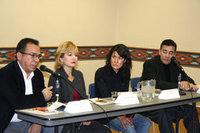The Drug War: For border residents, it's just the iceberg we knew was there all along
November 28, 2008
The Drug War raging in Juarez is just the open manifestation of a low-level conflict border residents have lived with for years, said one panelist at a UTEP forum that was organized by the student newspaper "The Prospector" and the Sam Donaldson Center for Communication Studies earlier this week.
Written by Sito Negron, Newspapertree.com

L-R: Corchado, Kocherga, Rodriguez, Olague / photo courtesy of Valerie Ortiz
The Drug War raging in Juarez is just the open manifestation of a low-level conflict border residents have lived with for years, said one panelist at a UTEP forum that was organized by the student newspaper "The Prospector" and the Sam Donaldson Center for Communication Studies earlier this week.
Calling the drug underworld a "parallel reality," Ruben Olague, former assignments editor for El Diario de El Paso, said journalists ought to do more work to understand the world that all border residents share -- for example, the common story of the guy who grew up next door, went to school with us, perhaps still attends our church or community center, and is part of the drug economy.,
It was one point in a wide-ranging discussion of the challenges faced by reporters covering Mexico, considered one of the most dangerous countries in which to work as a journalist. The panelists were Olague, Alfredo Corchado, Mexico Bureau chief for the Dallas Morning News, Angela Kocherga, Mexico Bureau Chief for KHOU TV in Houston, Diana Washington Valdez, a reporter for the El Paso Times who has covered Juarez extensively, and Sandra Rodriguez of El Diario de Juarez. The event was moderated by ABC-7 anchor Ken Molestina.
The panelists discussed examples of courageous reporters and institutions in Mexico, and the cost of doing the job. They gave some general advice on reporting in Mexico -- "strategize" before going in by lining up some research and organizing the itinerary beforehand, don't go alone, let someone know where you're going -- and said now is not the time for inexperienced reporters to take chances. As Kocherga said, "It's not the time to randomly go look for the 'big story.' "
Said Corchado, explaining that he has turned down opportunities to interview high-level drug traffickers: "For me the story is important. Is it worth my life? No." Once met face-to-face, he said, they assume a personal connection that can turn deadly.
One impetus for the discussion was the recent death of Armando Rodriguez, a Diario de Juarez reporter shot Nov. 13. [link] In the days that followed, another news outlet shut down temporarily, as threats to reporters escalated. [link]
One question from the audience was whether the cartels know the journalists or pay attention to the news. That led to a brief description of how the cartels work -- earlier, Corchado had stated that an estimated 500,000 to 700,000 people work for organized crime in Mexico.
The organizations are increasingly sophisticated, as any corporation, with people assigned to the various tasks of keeping the operation going. That means there are accountants, lawyers, enforcers, transportation specialists, and, Valdez noted, people or units assigned to intelligence, which includes reading and watching the news.
Corchado said that a few years ago, his newspaper wanted to send bodyguards to protect the reporters. That involves its own dangers, since bodyguards aren't always reliable, sometimes turning on their employers.
Despite the dangers, there are those who do risk their lives to tell the stories.
Valdez mentioned the Tijuana outfit Zeta, a publication co-founded by Jesus Blancornelas, who survived an assassination attempt and died of natural causes in 2006. [link] She also mentioned, at the national level, Proceso, which recently was in Juarez to do a story about the situation at Lomas de Poleo. [link]
But, she said, there aren't enough of those examples, and they're up against not only the drug cartels but also a corrupt system -- the cartels could not exist as they do, she said, without the support of government officials.
That led Olague to question what happens when the burst of violence subsides: "Do we go back to the way we were?"
![]()
![]()
Related Stories
![]()
Fair Use Notice
This site contains copyrighted material the use of which has not always been specifically authorized by the copyright owner. We are making such material available in our efforts to advance understanding of environmental, political, human rights, economic, democracy, scientific, and social justice issues, etc. We believe this constitutes a "fair use" of any such copyrighted material as provided for in section 107 of the US Copyright Law. In accordance with Title 17 U.S.C. Section 107, the material on this site is distributed without profit to those who have expressed a prior interest in receiving the included information for research and educational purposes. For more information go to: http://www.law.cornell.edu/uscode/17/107.shtml. If you wish to use copyrighted material from this site for purposes of your own that go beyond "fair use", you must obtain permission from the copyright owner.